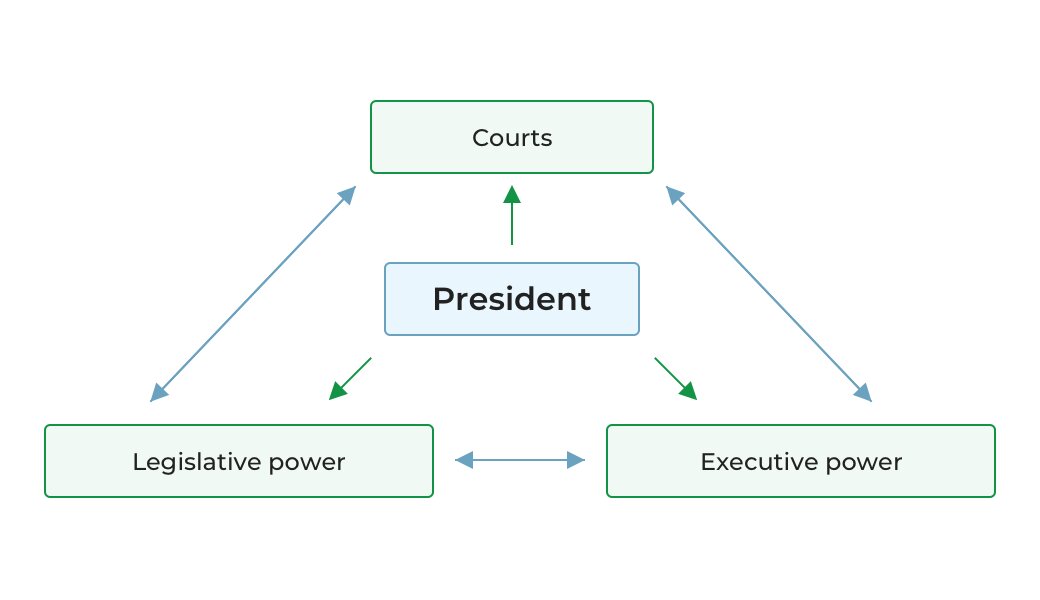State Structure
Country. Society. State.

When we say “Belarus has very beautiful nature” we mean the country.
When we say “Belarus needs active and talented young people” we mean the society.
When we say “Belarus helps compatriots abroad” we are talking about the state.
What do these most important concepts embrace?
Country is a geographical area with common historical and cultural background.
Society refers to people who live in one country and are linked by all kinds of bonds.
State is a political organization of society, institutions of government (President, Parliament, Government, Courts, etc.)
The Republic of Belarus (Belarus) is the official name of the state. Most people living in the territory of the state are its citizens.
Citizenship is a special legal relationship between an individual and a state, implying their mutual rights and responsibilities.
The state guarantees and defends the rights and freedoms of its citizens.
The rights, freedoms and responsibilities of citizens are enshrined in the Constitution.
Citizens are protected by the state, even when they are abroad.
Children at birth may be citizens of Belarus if either or both of their parents have Belarusian citizenship (the so-called right of blood).
People who have lived in Belarus for at least five years, without breaking the laws and working for the benefit of the country, can apply for the citizenship of the Republic of Belarus.
Unitary (from Latin unitarius – single; uniform)
All administrative and territorial units are subject to the same rules of law:
- one Constitution;
- uniform legislation;
- unified system of supreme authorities;
- subordination of local authorities to the central government.
Democratic
All citizens have the right to set the rules of the state. Representative authorities (President, Belarusian People's Congress, Parliament, Councils of Deputies) are elected by vote, which means:
- control of authorities by the public;
- diversity of opinions, political parties;
- local self-government.
Welfare
The state provides conditions for a decent life of all citizens:
- protection of rights to work, rest, health, etc.;
- targeted assistance to those in need: pensioners, large families, the disabled, and other categories of citizens.
Rule-of-Law
Rule of law:
- guarantee of the rights and freedoms of citizens;
- compliance of legislation with generally accepted standards of international law;
- mutual responsibility of citizens and the state;
- separation of powers which means the division of legislative, executive and judicial powers.

The President of the Republic of Belarus ensures the continuity of the government and is the Head of State, the guarantor of the Constitution, the rights and freedoms of people and citizens.
Powers of the President of the Republic of Belarus
- Appoints government members;
- Issues decrees and resolutions, signs bills into law;
- Makes state of the nation addresses to inform the public about the key objectives the country’s domestic and foreign policy;
- Represents Belarus on the international arena;
- Acts as the Commander-in-Chief of the Armed Forces of the Republic of Belarus;
- Presents state awards;
- Protects the sovereignty and national security;
- Makes key personnel decisions.
- Central body of power: Parliament.
- Local bodies of power: Councils of Deputies.
- Central bodies of power: Council of Ministers, ministries, state committees.
- Local bodies of power: Executive committees, local administrations.
- Central bodies of power: Constitutional Court, Supreme Court.
- Local bodies of power: Regional, district and economic courts.

The Parliament is the representative and legislative body. It is called representative because it represents the interests of voters – citizens of Belarus. It is called legislative because its main function is to pass laws.
The parliament in the Republic of Belarus is called the National Assembly. It consists of two chambers: House of Representatives and Council of the Republic.
House of Representatives

110 constituencies are set up in Belarus to hold elections to the House of Representatives. Candidates are elected in accordance with the law on the basis of free, universal, equal and direct suffrage by secret ballot.
Belarusian citizens who are 21 years old by election day may stand for election.
Council of the Republic (Chamber of Territorial Representation)

Members of the Council of the Republic are elected by the base-level local Councils of Deputies; eight more senators are appointed by the President.
A citizen of Belarus who has reached the age of 30 and has lived in the relevant region, the city of Minsk for at least 5 years can be a member of the Council of the Republic. The President of the Republic of Belarus, who has ceased to exercise his powers (expiration of the term of office, early resignation), can be a member of the Council of the Republic for life with his consent.
Every law is usually passed by the House of Representatives and the Council of the Republic. If necessary, conciliatory commissions are set up to find a solution that will suit both chambers.
Government - Council of Ministers of the Republic of Belarus

Government - Council of Ministers of the Republic of Belarus is the central state administration body, which administers the system of subordinate ministries, state committees and other organizations, as well as local executive and administrative bodies.
Council of Ministers:
- Head of the Belarus President Administration;
- Chairperson of the State Control Committee of the Republic of Belarus;
- Chairperson of the Board of the National Bank of the Republic of Belarus;
- Deputy Prime Ministers of the Republic of Belarus;
- Ministers of the Republic of Belarus;
- Chairpersons of the state committees of the Republic of Belarus;
- Head of the Council of Ministers Office of the Republic of Belarus;
- Chairperson of the Presidium of the National Academy of Sciences of the Republic of Belarus;
- Chairperson of the Board of the Belarusian Union of Consumer Societies;
- Other officials appointed by the President of the Republic of Belarus.
The Presidium of the Council of Ministers
The Presidium of the Council of Ministers of the Republic of Belarus is a permanent body that deals with issues within the powers of the Government if these issues require an urgent solution. It is made up of:
- Prime Minister of the Republic of Belarus;
- Deputy Prime Ministers of the Republic of Belarus;
- Head of the Belarus President Administration;
- Chairperson of the State Control Committee of the Republic of Belarus;
- Minister of Economy of the Republic of Belarus;
- Minister of Finance of the Republic of Belarus;
- Minister of Foreign Affairs of the Republic of Belarus.
The Prime Minister oversees operation of the government. The prime minister is appointed by the President of the Republic of Belarus with approval from the House of Representatives.
Ministers supervise ministries and bear personal responsibility for the performance of respective ministries
Ministries of the Republic of Belarus
- Ministry of Agriculture and Food;
- Ministry of Antimonopoly Regulation and Trade;
- Ministry of Architecture and Construction;
- Ministry of Communications and Informatization;
- Ministry of Culture;
- Ministry of Defence;
- Ministry of Economy;
- Ministry of Education;
- Ministry of Emergency Situations;
- Ministry of Energy;
- Ministry of Finance;
- Ministry of Foreign Affairs;
- Ministry of Forestry;
- Ministry of Healthcare;
- Ministry of Housing and Communal Services;
- Ministry of Industry;
- Ministry of Information;
- Ministry of Internal Affairs;
- Ministry of Justice;
- Ministry of Labour and Social Protection;
- Ministry of Natural Resources and Environmental Protection;
- Ministry of Sports and Tourism;
- Ministry of Taxes and Duties;
- Ministry of Transport and Communications.
Chairpersons of the State Committees are in charge of state committees and bear personal responsibility for interdepartmental affairs that concern all sectors.
State Committees of the Republic of Belarus:
- State Authority for Military Industry;
- State Border Committee;
- State Committee for Standardization;
- State Committee on Property;
- State Committee on Science and Technology;
- State Customs Committee;
- State Security Committee.
Members of the Council of Ministers are appointed and relieved of their posts by the President upon the recommendation of the Prime Minister.
Local government and self-government

The territory of Belarus is divided into the following administrative and territorial units:
- oblasts - 6, the city of Minsk;
- districts - 118;
- cities of oblast subordination - 10;
- towns of district subordination - 104;
- village councils – 1,140;
- urban-type settlements- 85.
Every administrative and territorial unit has its own governing body – an executive committee. Executive committees ensure the implementation of laws and operate all state-run facilities and property – enterprises, schools, special equipment, residential houses, etc. – on the territory of these administrative and territorial units. Executive committees also handle issues of local importance.
Courts

The interests of people and organizations often come into conflict. If one of the parties believes that there was an infringement on their rights or interests, this party can go to court for the restoration of justice.
The judicial power in the Republic of Belarus belongs to courts:
- The Constitutional Court has the power to review the constitutionality of normative acts in the state.
- The system of courts of general jurisdiction:
- The Supreme Court, oblast courts and the Minsk City Court, district / town courts which handle labor, housing, land, ecological, family, administrative and civil disputes, and hear criminal proceedings.
- Economic courts of oblasts and the city of Minsk which handle economic disputes over debts, bankruptcy.